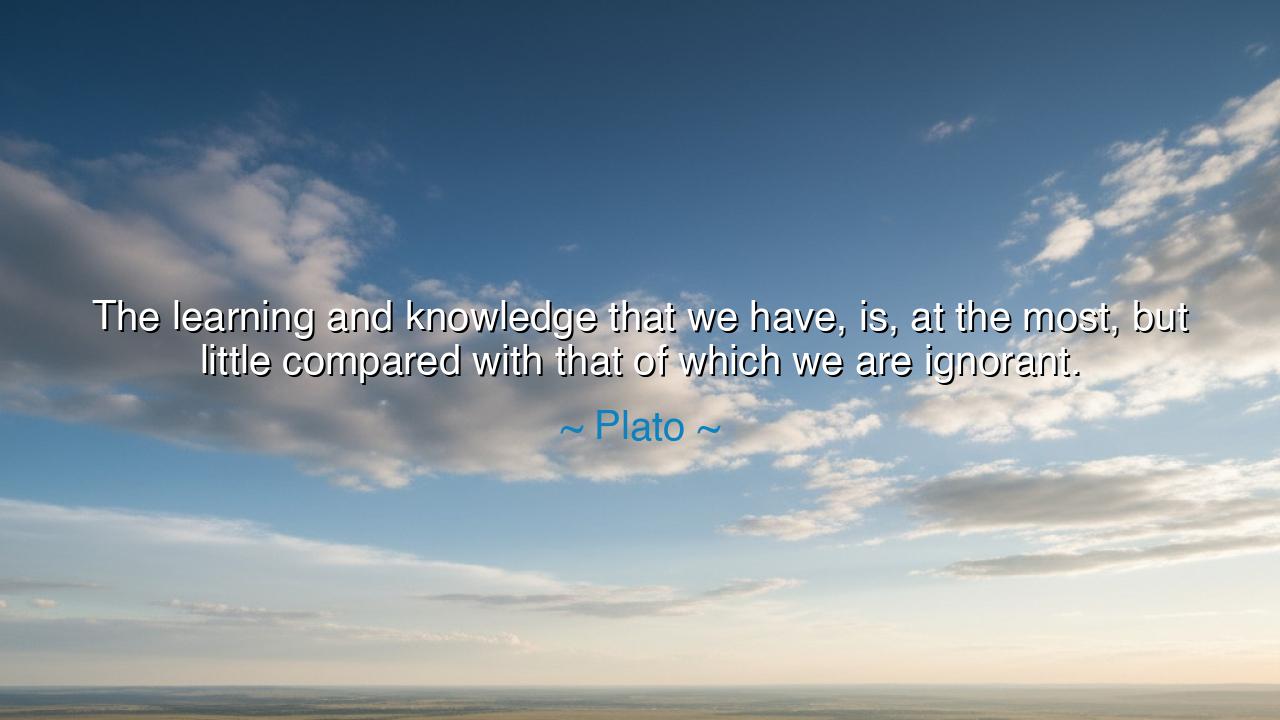
The learning and knowledge that we have, is, at the most, but
The learning and knowledge that we have, is, at the most, but little compared with that of which we are ignorant.






Hear the timeless words of Plato, philosopher of Athens and disciple of Socrates: “The learning and knowledge that we have, is, at the most, but little compared with that of which we are ignorant.” In this saying he humbles the pride of men, reminding us that no matter how vast our libraries, no matter how many truths we have uncovered, what we know is but a drop in the boundless ocean of the unknown. The wisest among us are those who feel most keenly their ignorance, while the fool imagines himself full.
Plato inherited this wisdom from his master Socrates, who declared: “I know that I know nothing.” This was not despair, but enlightenment. For to recognize the smallness of one’s knowledge is to awaken a deep thirst for truth. The proud believe themselves complete and cease to seek; the humble know themselves lacking, and thus continue to grow. Plato’s words are a summons to humility and to wonder, a call to see our ignorance not as weakness, but as the door to endless discovery.
Consider the tale of the explorers who first set sail upon the uncharted seas. Before Columbus crossed the Atlantic, before Magellan circled the globe, men thought their maps complete. Yet every voyage revealed more lands, more peoples, more mysteries than had been imagined. Their knowledge expanded, yes, but with each discovery their awareness of ignorance grew even greater. They learned that the world was vaster than their dreams, and that true wisdom lay not in claiming mastery, but in admitting how much remained unseen.
So too in the realm of science. When Newton revealed the laws of motion, men thought they had uncovered the ultimate truths of the universe. But centuries later, Einstein shattered those certainties, showing space and time themselves to be woven together. And even now, with our telescopes peering into galaxies and our instruments splitting atoms, every answer opens ten thousand new questions. Our learning is real, but our ignorance is infinite, and this truth should not shame us—it should inspire us.
Plato’s words also serve as a warning: beware the arrogance of thinking you know enough. The moment a man believes his knowledge sufficient, he closes the door to growth. He becomes blind, while the universe remains vast. True greatness is not in possessing all truth, but in forever seeking it. The wise man kneels before the unknown as before a temple, knowing that each step inside reveals new chambers, endless in their depth.
The lesson for us is this: walk always as seekers, never as masters. Cherish the learning you have gained, but let it humble you, not exalt you. Let it remind you of the vastness of your ignorance, so that you may hunger to learn more. Read, explore, question, reflect—and when you discover new truths, do not boast, but bow, for you have touched only the edge of infinity.
What then must you do? Each day, admit your smallness before the universe. Approach study with awe, not pride. Listen more than you speak, question more than you declare, and seek truth in all places, knowing you will never grasp it whole. Let your knowledge be like a lamp in the night: precious, but limited; bright, but surrounded by immeasurable darkness. And let that darkness draw you forward, not into despair, but into wonder.
Thus remember Plato’s words: “The learning and knowledge that we have, is, at the most, but little compared with that of which we are ignorant.” Take them as a sacred reminder that humility is the beginning of wisdom. For the universe is endless, truth is boundless, and the greatest joy of man is not to conquer knowledge, but to journey endlessly toward it.






AAdministratorAdministrator
Welcome, honored guests. Please leave a comment, we will respond soon